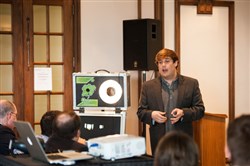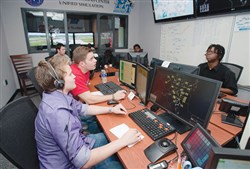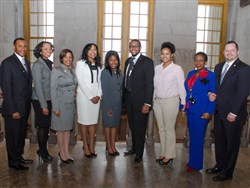VOL. 37 | NO. 15 | Friday, April 12, 2013
Get started before graduation
By Hollie Deese
It’s always been easy to get a job out of college if mom or dad is chairman of the board.
It’s even easier if the graduate is chairman.
The experiential learning trend on university campuses fosters the career aspirations of students by helping individuals create their own companies and nonprofits – sometimes before graduation – by focusing on finding suitable internships and through course integration.
Universities as diverse as Vanderbilt, Belmont, Tennessee State, Lipscomb and Middle Tennessee State are actively preparing undergraduates and post-grads to find careers in an ever-changing job market.
“We try to start with students from the very beginning and give them the opportunities to think about what they are looking for in terms of how they want to be prepared coming out of Vanderbilt,” says Cynthia Cyrus, associate provost for undergraduate education.
“We are also encouraging them to really think about what it is that an enriching career is going to look like. One of the things that studies are showing is that the old model of having a career path no longer applies.”
Here’s how some of these ideas are playing out on Nashville area campuses:
l Belmont senior Andrew Bishop, 22, who will graduate this spring with a social entrepreneurship degree, started his own nonprofit while at Belmont. He’s founder and executive director of PhilantroTeach. “Belmont was an integral part of me being able to do that,” Bishop says.
l Last year 51 percent of VU graduates went directly to paid employment, says Cyrus, adding 34 percent went on to graduate school and 15 percent started their own businesses, volunteered, traveled or are in the military.
l MTSU’s aerospace department, developed in 1942, includes one of the largest university air traffic training initiative programs in the country. “We put an enormous amount of people into the FAA,’’ explains Debra Sells, VP for student affairs and vice provost for enrollment and academic services.
l TSU has revamped its internship program, partnering with HCA, The Urban League, Nashville Cares, Target, Dell, state government and many others, and according to Karon Uzzell-Baggett, TSU career center director, has a renewed emphasis on matching students with companies that are hiring.
l Lipscomb has recently reworked its general education program with more integrated coursework to move it more in line with what employers are looking for from graduates. “We are trying to find the marriage between a liberal arts education and the professional world,’’ explains Lipscomb’s Randy Bouldin, associate provost of graduate studies. “This is not always an easy marriage to find but you have to look for it.’’
BELMONT: Entrepreneur U.
Belmont’s Center for Entrepreneurship has been named one of the Top 25 undergraduate entrepreneurship programs in the country by The Princeton Review, and nearly 20 current businesses are in operation after starting at Belmont, including restaurants, marketing companies and photo studies.

In an Annual Business Plan Competition, Belmont senior Ross Hill gives a presentation for his entrepreneurial effort, PictureBooth (www.picturebooth.co/PictureBoothCo/PictureBoothCo_Landing_Page.html), which earned him the Outstanding Student Entrepreneur of the Year award and a $5,000 prize.
-- Andrea Hallgren/Belmont UniversityBelmont also provides office space for Brentwood native Bishop, who’ll graduate this spring. Bishop’s nonprofit, PhilanthroTeach, partners local college instructors, graduate and undergraduate students, and members of the business community with unemployed and economically disadvantaged individuals to improve their job skills.
“We started at Belmont, and we have community professors from Lipscomb, Vanderbilt, Trevecca, and they go out in the community to work with our partners to teach our clients job readiness skills,” Bishop explains.
“We have served over 600 people since we started in early 2011, and we have put in over 2,000 volunteer hours into the community and generated a financial impact on that (of) $60,000 of service to the community.”
During his time at Belmont, Bishop also founded and served as president of All About Kids, a youth community action organization, and he launched GrantWorks, a grant-writing consulting service for nonprofits.
“When you look at a lot of master’s programs, one of the faults is they focus so much on academic theory and the theoretical management of business, but they are not adequately preparing you to immediately go into the workplace,” Bishop explains.
“I think Belmont’s program is a direct transition from undergraduate to graduate, they heavily focus on internships and experiential learning and that sets Belmont’s MBA program apart. They are trying to cultivate natural, driven, leaders out of their MBA program.”
“We are an institution that is focused on individual development and providing that holistic experience,” says Thomas Burns, provost. “It is about creating well-educated students who are thoughtful, responsible, committed in their faith and making sure they want to go out and transform the world.
“We are preparing the next group of leaders and some of the projects some of our students have been involved in while they are students have already shown that.”
From Vanderbilt to ‘almost anywhere’
Like any university, some students will go on to graduate school, while others will hit the job circuit. Vanderbilt wants to prepare students for both.
“About a third of our students go on to graduate studies,” Cyrus says. “And what is really interesting is that the education student might be going to law school. Or a student who is in history might be going to med school.
“So a lot of people come to Vanderbilt because it gives them the ability to get a well-rounded education, and then they can pursue their particular professional path when they leave us.”
Doug Christiansen, vice provost for enrollment and dean of admissions, says it is that ability for students to connect the dots across all areas of study and platforms that is the biggest change for college students in recent years.
“The student who is going to move forward in their career at Vanderbilt and then move on to a happy, successful work life is going to have to be able to understand the outcomes, not the input,” he adds.

MTSU students work in the flight operations data positions of the Aerospace NASA Flight Operations Lab in the university’s Business and Aerospace Building during a three-hour simulation.
-- Andy Heidt | Middle Tennessee State University“The students have an ability to mix and match skills and are driving where they want to go in the future, and from Vanderbilt you can really go almost anywhere,” Cyrus says. “An undergraduate degree is a really good next step, but it is not the final step in the path that they are taking.”
Ultimately, finding success rests on the student. Vanderbilt’s emphasis is ensuring the resources are there and easy to find, particularly for freshmen.
The Martha Rivers Ingram Commons is where first-year students live together in 10 houses, each guided by a faculty member serving as a mentor.
Vanderbilt Visions is mandatory for first-year students to encourage them to become responsible members of the campus community. The program begins during the first semester, and all first-year students are assigned to one of 92 Visions groups connecting students to upper-class, peer mentors and faculty members to help transition them from high school to university life.
Together, students explore their goals, expectations and strategies to address the academic and social pressures.
“Students work with peer mentors or career center staff to do exercises like life mapping and have thoughtful conversations around career profiles,” Cyrus adds.
“One thing that enriches our campus conversations is that so often the pictures of what they want to do are going to change between that first semester and as a second semester junior as they get ready for grad school applications or job applications. So we try to leave as many doors open to our students as possible.”
One way to do that is have students commit themselves fully in their course of study on and off campus to make sure it is really what they want to do.
“We really believe immersion as an undergraduate is giving them a real opportunity to develop intellectual and skill-based tools that they can apply even in places outside of that major,” he says.
MTSU: Lights, cameras, airplanes
At 22,371 students, MTSU has the largest undergraduate population of any school in the state. And while Kelsey Lebechuck, 20, is just one of them, she feels anything but lost in a crowd.
Lebechuck transferred into the College of Mass Communications from the UT-Chattanooga in the fall of 2011 after realizing her chosen safe path in physical therapy wasn’t the right.
“My whole life, my mom told me I needed to be a journalism major, but I, of course, refused,” she explains. “That was not the cool thing to do, you didn’t make any money. I wasn’t doing that. So I went to UTC to pursue physical therapy, but college algebra told me that was not what I was going to be doing.”
After she volunteered at a telethon, her entire mindset changed.
“I fell in love,” she says. “The whole environment - the lights, the cameras. I was like, ‘Yeah, this is all I want to do.’”

Thirteen Tennessee State University students are interning at Legislative Plaza this session, while many more are interning across the area, state and beyond. Pictured are, from left, James Marlowe, Miranda McDonald, Lauren Amos, Leslie Hughes, Rashaun Pool, Shelby Rogers, Starr Jones, Marian Short and Paul Marsh. Other TSU legislative interns not photographed are Akudo Amadi, Brian Williams, Aaron Conyers and Jada Flowers.
-- John Cross, Tsu Media RelationsShe transferred to the Murfreesboro campus to focus on producing, but her curriculum puts her through all of the paces of new media.
“My professors say I can’t be a one-trick pony in today’s media, and that you have to know how to do everything,” Lebechuck explains. “And while I was excited for the mass communication program when I enrolled, I did not know how awesome it was until I got here.”
Last year the Mass Communications department opened its Center for Innovation in Media, a $700,000 facility that brought together the offices for the student-run newspaper, Sidelines, the student-run radio station, WMTS-FM, the student-run record label, MT Records, the student-run cable station, MT 10, and WMOT-FM, the 100,000-watt public campus radio station.
The center also allowed the school to expand its course offerings in digital multimedia skills.
“The demand is for students who can go across platforms, and that is what we want them to be able to do,” Sells says. “Our students do sports’ broadcasts for ESPN3. They go up to Nashville and work on some of the Music Row productions.
“Our students are getting great, hands-on experience in a $1.5 million dollar media production studio truck that rivals what some of the local Nashville news stations have. We had digital formats in our electronic media communication areas before all of the network stations in Nashville had them.”
MTSU’s aerospace department is another standout when it comes to career prep. Graduates from the air traffic training program are recommended to the Federal Aviation Association for the final segment of Air Traffic Controller training and hiring.
“Our students work all over the world, all around the country, and particularly in this part of the country, they are in an awful lot of airplanes that you will fly,” Sells says.
A little more than five years ago, MTSU purchased 25 planes from Diamond Aircraft and The New Piper Aircraft Inc. for $4.8 million. They are kept at the Murfreesboro Airport.
A 747 donated by Federal Express several years ago serves as a converted classroom. A state-of-the-art air control simulator is able to recreate the conditions of about a dozen of the busiest airports around the world, day or night, rain or shine.
“The TSAA has been out to look at it, and it is a model that is pretty unique in the world,” Sells says.
TSU: Matching students, businesses
Tennessee State, like MTSU, actively looks for opportunities to find internships and full-time employment for students by hosting companies on campus.
Both schools encourage students to get connected to their careers through internships during their undergraduate time on campus, and it isn’t just lip service. The schools work hard to make those connections happen.
“We really tried to revamp our program in the last few months,” says TSU’s Uzzell-Baggett. “The students are starting to wake up to the power of internships, and data really helps drive the point home that when you have that internship under your belt, it really causes people to take notice when they are looking at your resume because you have distinguished yourself.”
This year, TSU students have been placed at internships with HCA, The Urban League, Nashville Cares, Target, Dell, Chrysler, Triumph Aerostructures Group, Tennessee Bureau of Investigation and Kentucky Utilities. One student is about to leave for The Washington Center in Washington, D.C., and 13 students are interning at the state legislature.
“It is still tough out there, and you need to distinguish yourself, particularly here in this area where we have competition from all these other universities who are producing excellent graduates,” Uzzell-Baggett says.
“We are hosting Tyson for a two-day visit,” Uzzell-Baggett says. “We had InSight St. Louis here earlier this week looking to recruit students for internships and also hire full-time positions to the St. Louis area, which is rich in lots of headquartered companies.”
InSight St. Louis is a non-profit organization dedicated to recruiting the best graduates from historically black colleges to the St. Louis region.
TSU also wants its graduate students to play an active role on the campus community before moving into the workforce.
Graduate student Delila Duarte, who is starting the dissertation process, works with first generation Latino students to keep them in college. She helped launch FUTURO on campus, a student leadership division of the Tennessee Latin America Chamber of Commerce.
“FUTURO’s focus is a professional development association for Latino college students in the Middle Tennessee area,” Duarte explains. “We are inclusive, especially at TSU, and that is what I love about our chapter. We are very diverse and it is a unique connection that really assists us in many different ways.”
FUTURO focuses on many areas of development, including academic success, development of professional skills and community service.
“Unfortunately, we see Latinos, especially males, lag far behind in completing their college degrees, so this is very important to us,” Duarte says. “As I have gotten further ahead professionally, and I look back, I feel as though there are fewer resources for that first generation college student going through that higher and advanced degree process.
“We want to help those college students not only in their first year, but their second year and throughout the entire process. And make sure, absolutely, with the goal of them finishing their college degree.”
LIPSCOMB: Flexibility, course integration
Like Belmont, Lipscomb University also focuses heavily on developing the whole student.
The faculty is accessible to students, one of the reasons graduating senior Roxanne Spievogel, 22, chose Lipscomb.
Spievogel’s major has changed a few times over her time at Lipscomb, but despite her parents’ nervousness, the school’s staff was proactive in helping get her degree in four years. She will be graduating this spring with a degree in application development from the school of computing and informatics.
“My parents thought for sure I would be a semester behind, or a year behind, and that is just more money down the drain,” she says. “But a big thing for me was to switch to a major where I could develop a skill, and I think they understood that.”
Schools need to be more flexible for students who are finding themselves, says Bouldin, the associate provost. He recently helped revamp the general education program with more integrated coursework, making it more in line with real-world needs.
“We do feel very accountable to parents who are paying all this money for gen ed, and we want their experience in general education to be more than what they had in high school,” Bouldin says. “They studied biology, but did they study it along with nutrition? So they studied those basics [as] stand alones but have never had an opportunity to integrate those areas, and that is what we are trying to provide for them.”
Parents who might have been wary about paying for a degree in the arts might find the price tag a little more palatable if they know that art degree will translates into a real job after graduation.
The answer for both schools is internships and course integration. Spievogel is finishing her fourth internship, this one at local email editor Emma, although it is her first internship in her graduating major. In fact, it was her previous internships that helped her focus her major.
“I did an account management internship and marketing internship with Music City Networks,” she says. “They also do website development, and I realized I wanted to be the one in the back making websites instead of marketing websites. And that is when the changed happened.”
Creating more niche curricula is where things are headed, but Bouldin is sure that will change eventually and Lipscomb will be prepared to adapt for whatever students need to succeed.
“It is a sword that cuts both ways because you do have to keep your curriculum current because niche programs have a tendency to morph more quickly than programs that are more traditional,” he says. “We try to keep a constant eye on the curriculum and in the market.
“You can’t just have a focus group to start with and then never look into the market again. That is not going to accomplish very much. But you do need to be aware of how the market is changing so you can change the experience for the student here as that happens.”